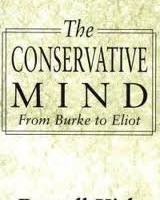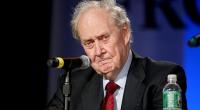‘The Conservative Mind’ at 60, by Jeffrey O. Nelson
President Barack Obama’s decisive electoral victory this past November caused panic in some conservative circles. Questions about the continuing relevance of conservative first principles are common fodder for the chattering classes, both right and left.
But there is not much that is really novel in this latest conservative setback. Some 60 years ago, the chief role of conservatives was to resist and oppose, even as a Republican assumed the presidency. And almost 50 years ago, conservatives suffered an even more complete catastrophe at the polls.
One landmark book published in the spring of 1953 by a young Michigan State College professor began to change all that. Russell Kirk’s “The Conservative Mind” contributed to the re-imagining of American politics by countering the prevailing liberal narrative that there was no such thing as a conservative tradition in America.
Kirk did so by sketching intellectual portraits of key writers and statesmen from the 18th century to the present, each of whom had added to the deposit of conservative thought.
The 60th anniversary of Kirk’s book is a good opportunity to reflect on the prospects for conservatism today. For the past half-century, generations of conservative thinkers, journalists, and politicians have been moved by Kirk to confidently assert a new conservative vision. That vision was enough to elect presidents and congressional majorities.
So what does “The Conservative Mind” still have to teach a new generation struggling once again to find an authentic and convincing American conservative voice?
Below are a few ways in which Kirk’s book is more than a touchstone of a bygone era and instead remains a vital resource for conservative renewal.
Kirk was fond of quoting Napoleon about the power of the imaginative faculty. In the new world of electronic images, and now social media, the sway of abstract reason and discussion has declined and “the age of sentiments,” in Kirk’s words, has replaced it.
Kirk’s book was an extended exercise in the narrative application of imagination. He did not just outline an Anglo-American conservative genealogy, he imaginatively constructed, some say even invented, one.
What lingers with conservatives after reading Kirk is the striking impression of an encompassing spiritual standpoint; the disposition Kirk communicates is just as important as the particular arguments he advances. Well before today’s cognitive behaviorialists, Kirk understood that people are moved to act principally by feelings, intuitions and affections.
He also knew that such feelings proceed directly from thoughts, and so he set out to reframe popular thinking about conservative ideas in a positive way, and to elicit intelligent conservative action from his readers.
He often did so by evoking ideas expressed in literary and artistic works that appeal to the very sentiments Kirk believed conservatives were obliged to renew.
This approach is why optimism even in the face of defeat is so integral to Kirk’s vision. Kirk’s “imaginative conservatism,” as he termed it, still provides the best guide to constructing a positive vision that appeals to both mind and heart.
Successful conservative politics in America has always resulted from a balanced approach to economic matters and social concerns. The Clinton-era “It’s the economy, stupid” battle cry proved so tempting to business-minded conservatives that they adopted it with the aim to cast contentious social issues aside for good.
But in the face of events at home and abroad, conservatives are having to learn again that issues related to community and culture are the most intractable in politics. They will not go away. And seizing on the right social issues, with tact, is often what gives the conservative his winning edge in politics.
Strong social framework
Kirk championed a conservatism that embraced the dynamic economic power of markets within a larger, more stable social framework. Kirk believed that if the core institutions that comprise civil society — family, church, school, civic associations, hospitals, volunteer organizations — are strong and vibrant and left free from government interference to pursue their natural ends, then economic freedom would also flourish.
He also believed that economic prosperity would, in this arrangement, advance more evenly and with much less of the dislocation and disruption that has frightened the middle classes away from conservative policy positions in recent years.
Great Society-style politics may be booming just now, but studies demonstrate over and over that a bust is on the horizon. Conservatives have the opportunity—and the obligation—to prepare for the coming burst of the entitlements bubble by fashioning a compelling and workable alternative, which will inevitably rely upon economically independent and morally vibrant communities.
Kirk believed that a people flourish when their communities do. When civil society is strong, the national interest is advanced almost as a matter of course.
For conservatives to reclaim the allegiance of the middle class they will need to rise above the rhetoric of mere individualism, even as they resist, or turn back, the advance of the federal government in our lives. Conservatives will need to rediscover the language and policies of a political movement that puts communities first.
Robert Bork o dell’irriducibile fedeltà al vero, by Marco Respinti
Robert Bork è morto il 19 dicembre all’età di 85 anni ad Arlington, in Virginia, ma alla memoria di chi ha amore per la verità non mancherà mai.
Robert Heron Bork era nato il 1° marzo 1927 a Pittsburgh, in Pennsylvania, è stato giudice combattivo ed eminente giusperito, e i suoi nemici lo hanno odiato al punto di coniare per lui un neologismo, il verbo “to be borked”, ovvero vedersi precludere incarichi di prestigio per via mediatico-democratica. Candidato a diventare giudice della Corte Suprema, Bork fu infatti travolto dall’uragano di contumelie scatenatogli addosso dalla magistratura politicizzata a sinistra, dalla Sinistra politica e della stampa “progresssita” e “illuminata”.Per carità, avvenne tutto secondo le regole democratiche, ma è proprio in casi come questi che le regole da sole mostrano di non essere affatto sufficienti e la democrazia senza orientamenti morali sbanda.
Bork aveva infatti un grande, enorme difetto. Credeva in maniera tetragona nel diritto alla vita, nella famiglia monogamica eterosessuale e nella Bibbia piuttosto che a Charles Darwin, e non perdeva occasione per dirlo; ovvero, da uomo di legge e di cultura qual era, per mettere in guardia gli americani dai guasti che il relativismo sempre più imperante produce. Orbene, tutto ciò negli Stati Uniti fa di una persona sia un conservatore sia il bersaglio preferito dei cosiddetti liberal.
Tutto iniziò il 1° luglio 1987, quando l’allora presidente Ronald Reagan annunciò la decisione di proporre Bork alla suprema magistratura giuridica del Paese. All’epoca Bork era (sempre per nomina reaganiana) giudice della Corte d’Appello del Distretto di Columbia, dopo essere stato a lungo e onoratamente docente di Diritto nell’Università Yale, specializzato in norme antitrust, e avere avuto come studenti una pletora di nomi famosi, fra cui Bill e Hillary Clinton.
Reagan aveva però già commesso due “delitti” imperdonabili agli occhi dei liberal: nel 1986 aveva proposto William Rehnquist come presidente della Corte Suprema e il giudice Antonin Scalia come nuovo membro della stessa assise. Rehnquist era colui che nel 1973 aveva firmato il parere di minoranza contro la sentenza che, a chiusura del famoso, e famigerato, e basato su una frottola, caso “Roe v. Wade”, ribaltò improvvisamente, con un vero e proprio colpo di mano, le leggi a favore della vita umana nascente allora vigenti in numerosi Stati dell’Unione americana legalizzando l’aborto ovunque. Scalia era un altro noto campione del conservatorismo culturale e sociale, e per di più un cattolico integerrimo. Per la Commissione sulla Giustizia del Senato federale di Washington, l’organismo incaricato di vagliare le qualità professionali dei giudici indicati dalla Casa Bianca, permettere a Reagan d’inserire in quella formidabile squadra pure Bork fu troppo. E l’inferno si scatenò.
Fu Ted Kennedy ad appiccare il fuoco. Erano infatti trascorsi solo una manciata di minuti dall’annuncio della decisione di Reagan che il senatore Democratico del Massachussetts Ted Kennedy pronunciò un discorso inverecondo e strabiliante in cui affermò che con Bork alla Corte Suprema le donne statunitensi sarebbero state costrette ad abortire clandestinamente nei vicoli bui, che per le persone di colore si sarebbe riaperta la stagione della segregazione razziale, che i cittadini avrebbero dovuto guardarsi le spalle dagli agenti della “gendarmeria morale” e che tutti quanti avrebbero dovuto combattere quotidianamente contro una pervicace censura del “libero pensiero” degna di uno Stato totalitario.
Il discorso di Kennedy suonò la sveglia, e tanto i media quanto gli avversari politici di Bork scesero immediatamente in campo. La Commissione Giustizia del Senato fu subito lo strumento opportuno per fare la guerra a Bork, ma soprattutto a ciò che Bork (come Reagan) rappresentava in termini culturali e giuridici. La lotta fu senza quartiere e senza precedenti. Già non si poteva tollerare che qualcuno nutrisse la fede nei “princìpi non negoziabili” che animava graniticamente Bork, ma che poi questo qualcuno diventasse pure membro dell’organismo preposto a vegliare sulla costituzionalità delle leggi americane, e per giunta con la benedizione palese di un presidente “reazionario” e connivente, era, per un certo mondo, inconcepibile.
Read the complete article in La nuova bussola quotidiana
On Georgetown and the Essential Unity of All Knowledge, by James V. Schall, S.J.
In its editorial occasioned by Georgetown University’s invitation to Kathleen Sebelius—a Catholic, who is engineering the requirement that Catholic institutions must provide services to any employee, even if they include things contrary to conscience, faith, and reason—the Catholic Standard (May 10) called the invitation disappointing “but not surprising.” Though this statement is rather blunt, it is probably too mild in light of the damage the invitation causes. It is more than “disappointing,” though it is indeed no “surprise.”
The distance that many Catholic universities are perceived to have moved from Catholicism is, for many, illustrated by the publicity of this invitation. Honoring the person who intends to shut one’s institution down unless it conforms to laws that deny religious liberty and human intelligence seems, at best, dubious.
The best background “theory” about why Sebelius was interested in this invitation is that the Obama administration does not think it can win the election if people are reminded of the economy. Thus, effort is made to shift attention to what are called “moral” issues, a euphemism for the use of “rights” to redefine the whole field of public life. Obama’s advocacy of gay-marriage also falls into this category. The administration understands the value of splitting the religious vote between those who stand for Christian teachings and practices and those who reject them but insist on changing the Church to conform to the secular pattern. However many can be enticed by this tactic may be enough at the polls to win reelection. The only bad prince, as Machiavelli put it, is one who loses power.
The Church would expect, at a time when its liberty of mission and action is threatened by specific governmental decree, that universities, not just Catholic ones, would be the first to come to its aid. But they seem to be the last. They appear mostly indifferent to what has been probably the most unique of American legal innovations about the relation of religion and government. The Sebelius invitation, from the outside, seems an indifference to the Church by those who would be most expected to support her on the grounds of intelligence itself.
The issue is whether universities called “Catholic” have not become rather secular with vague religious symbols still about but no substantial connection with what it is to be Catholic in reason and intelligence. The bishops, for all their courage in facing this question, have not addressed the factual question about what is the actual orientation of universities that are called “Catholic” for whatever reason.
II.
Meanwhile, Pope Benedict XVI has been speaking to various groups of the American hierarchy on their periodic visits to Rome to report on the status of the local Church. To the final group of visiting American bishops, the pope spoke of education. “Catholic colleges and universities need to reaffirm their distinctive identity in fidelity to their founding ideals and the Church’s mission in service of the Gospel,” Benedict observed. Obviously, Benedict knows that both the identity and fidelity are in serious question in many if not most universities. The universities are not doing what might be expected of them. The pope tells the bishops, however, that “the schools remain an essential resource for the new evangelization” He acknowledges that they should be better recognized and supported.
“It is no exaggeration to say that providing young people with a sound education in the faith represents the most urgent internal challenge facing the Catholic community in your country.” The young, in fact, have a “right to encounter the faith in all its beauty, its intellectual richness and its radical demands.” One would be hard-pressed to say that the young are so presented with this fullness in many of our schools.
Education is directed both to minds and hearts. “The question of Catholic identity, not least at the university level, entails much more than the teaching of religion or the mere presence of a chaplaincy on campus.” The pope is direct. “Catholic schools and colleges have failed to challenge students to re-appropriate their faith as part of the exciting intellectual discovery which mark the experience of higher education.” The pope himself clearly understands the excitement of intellect, an excitement enhanced and elevated by revelation directed to reason. The harmony of faith and reason should guide our life-long “pursuit of knowledge and virtue.” In this endeavor, teachers and professors are vital. This fact underscores the issue of who is hired and by what criterion. If it is only a secular criterion, the school will soon be secular. The “splendor” of truth, both human and divine, needs to be seen in the teachers themselves.
By its nature, faith incites us to know the fullness of truth that includes what Christ revealed. And who is Christ? “He is the creative Logos in whom things were made and in whom all reality ‘holds together.’” Christ is the new Adam who reveals “the whole truth of man,” a phrase that Bl. John Paul II used to love. The pope here repeats a title that is proper to Christ, something that he discussed in his Jesus of Nazareth. Christ is the new Adam “who reveals the ultimate truth about man and the world in which we live.”
Read the complete article in Catholic World Report


